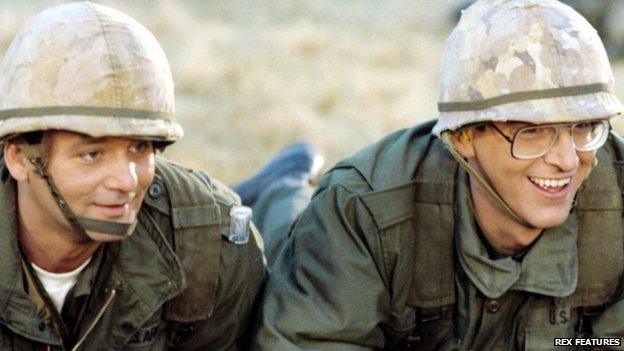Ghostbusters star Harold Ramis dies aged 69
- Published
Alistair Leithead reports as tributes have been paid to Harold Ramis
Actor and director Harold Ramis, best known for the films Ghostbusters and Groundhog Day, has died aged 69.
He died of autoimmune inflammatory vasculitis, a rare disease that involves swelling of the blood vessels, his agent told the BBC.
The star found fame as bespectacled ghost-hunter Egon Spengler in the Ghostbusters franchise in 1984.
But he was also a talented writer and director, whose credits included Caddyshack and Animal House.
"His creativity, compassion, intelligence, humour and spirit will be missed by all who knew and loved him," said his family in a statement.
The star had reportedly been quiet about his illness, which dated back to 2010.
'The real deal'
But several friends are said to have visited him recently, including Bill Murray from whom he had been estranged for years, the Chicago Tribune said.
Ramis' death prompted an outpouring of tributes on Twitter.
Billy Crystal, who starred in the director's mobster comedies Analyze This and Analyze That, wrote, external: "Sad to hear my friend Harold Ramis passed away.
"A brilliant, funny actor and director. A wonderful husband and dad. Big loss to us all."
The star found fame as bespectacled ghost-hunter Egon Spengler in the Ghostbusters franchise in 1984
Iron Man director Jon Favreau added, external: "No, no, not Harold Ramis. Worked for him years ago. He was the real deal. Growing up, his work changed my life. He will be missed."
'Straight man'
Family Guy creator Seth McFarlane wrote, external: "Harold Ramis was a brilliant, shining example for every comedy writer hoping to achieve excellence [in] the field."

Ramis wrote, produced and directed Groundhog Day, about an irascible TV weatherman forced to live the same 24 hours over and over
Born in Chicago to convenience store owners Ruth and Nathan, Ramis studied at Washington University in St Louis and, on graduation, briefly worked in a psychiatric ward.
He started his career as a writer by penning arts stories for his local newspaper and editing Playboy magazine's "party jokes" section.
After leaving the magazine, he joined Chicago's renowned Second City improvised comedy troupe but said he realised his limitations as a performer after encountering John Belushi.
"When I saw how far he was willing to go to get a laugh or to make a point on stage, the language he would use, how physical he was, throwing himself literally off the stage, taking big falls, strangling other actors, I thought: 'I'm never going to be this big.'"

Ramis made a total of six films with Bill Murray, including military comedy Stripes
Instead, he played the straight man - acting as a sardonic foil to Bill Murray in the army comedy Stripes, and playing the most straitlaced and scientifically inclined of the Ghostbusters team.
The film, a global smash in 1984, spawned a sequel in 1989 as well as a long-running cartoon series. A third instalment had been in development for several years.
Ramis acknowledged that the spectral comedy was his most memorable work but took pride in its longevity.
"People love Ghostbusters in a really big way," he said in 2009, external. "Parents loved it for their kids. Teachers loved it.
The film remains one of the most successful comedy movies of all time, with takings of more than $500m (£300m) adjusted for inflation.
After the sequel, Ramis developed his career behind the camera, directing Bill Murray in Groundhog Day and Robert De Niro in Analyze This.
His other films included The Ice Harvest, Bedazzled and prehistoric comedy Year One, his final movie, in 2009. More recently, he had directed episodes of NBC television's The Office.
Ramis also inspired a new generation of film-makers, including Judd Apatow, who cast the director in his 2007 comedy Knocked Up.
He is survived by his wife, Erica, sons Julian and Daniel, daughter Violet and two grandchildren.

Ramis received an American Comedy Award and a Bafta for screenwriting